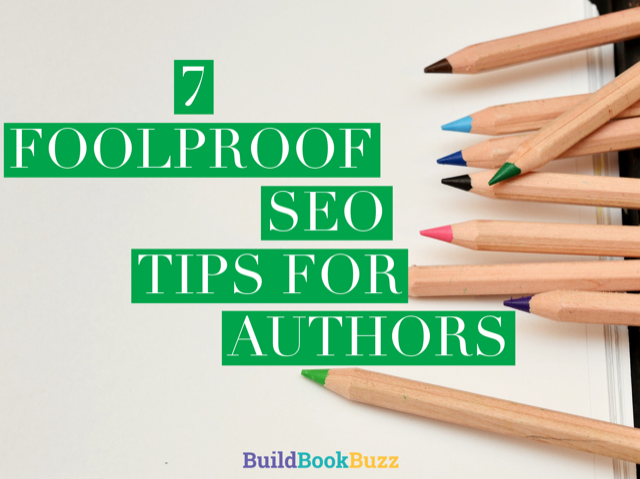7 foolproof SEO tips for authors
Understanding SEO is incredibly important for authors. Here are 7 foolproof SEO tips that will help your site and books get found online.

I’ve known Miral Sattar, CEO of Bibliocrunch, a resource for authors, for years. When she talks, I listen! Miral has worked in the media industry for 15 years, most recently at TIME Magazine, where she developed and implemented the digital SEO strategy that enabled TIME to be one of the most trafficked sites in the industry.
Miral has lectured at Yale, NYU, CUNY, Pace, and other universities across America and helped numerous authors market their books. She has a master’s degree in publishing (digital and print media) from NYU and a bachelor of science degree from Columbia University in electrical engineering and computer science. Follow Miral on Twitter.
7 foolproof SEO tips for authors
By Miral Sattar
Let’s be honest. You understand the power of Google, but have no clue how it works, right?
This lack of understanding can be a problem for authors, though.
You rely on Google, the largest search engine in the world, to help readers discover your books, so you really should know at least the basics about how to get found.
What you do to your website and Amazon sales pages to make sure they’re discovered through Google searches is called search engine optimization – SEO. And there’s lots you can do to make sure that readers find you and your books when they’re searching online for your topic, name, or even parts of your book title.
Here are seven ways you can use the power of SEO to make it easier for readers to find and discover your books immediately.
1. Optimize your Amazon pages.
There’s no question that Amazon is one of the most well-indexed sites online. The search box there is a search engine, after all. Actually, if you search for your book or your name, it’s likely that your Amazon page will show up much higher than your website does.
Here are a few things you can do to optimize your Amazon pages:
- Make sure you have an Author Central account with your bio and picture. This will help you rank higher on Amazon searches.
- Connect your social media accounts to your Amazon Author Central page.
- Make sure your book has the relevant keywords you would use to find a book like yours.
2. Start blogging on your website and do it in a meaningful way.
It’s important to have a blog because it’s the key way that people learn about books.
It’s a good idea to blog to add value and not just to blog for the sake of blogging. David Gaughran and Joanna Penn are great examples of authors who blog effectively.
Blogging helps make sure that when people type your name into the Google search box, your website shows up on the first page of search results. They will then get to your site, where you have all the information about you and your books that they need (and want).
3. Optimize your blog for Google.
You want to make sure that your blog is optimized for Google so that when it gets “crawled” or visited by all the major search engines, they will find the right content.
Plugins that include Yoast will help you set up tags, title, keywords, and metadata.
Another way to optimize your blog is with sitemaps. This is a structured listing of all the pages on your blog or website. It tells Google and other search engines about your site’s structure.
A sitemap also lets Google know when a new post is published so it can index it and add it to search results.
4. Understand and use outbound and inbound linking.
Linking (links from one site to another) is another critical element of SEO.
You want other sites to link to your content, and you want to link to theirs, too. Let the sites you link to know you’ve linked to them so they can link back to you, too.
When someone links back to your blog posts, it’s basically a vote for your content as far as Google is concerned. Those links to your site are weighted by Google according to their reputations. For example, if TIME.com links or Buzzfeed.com links to your site, you get the equivalent of bonus points from Google.
5. Guest blog.
Guest blogging is a great way to establish yourself as an expert. It provides an opportunity to link back to your book or site in your bio that runs with your guest post (like the bio at the beginning of this article).
When author Hymn Herself wrote a blog post about 5 Things Movies Don’t Tell You About Mental Institutions for Cracked.com, the link to her book in the article bio helped her sell 1,000 copies in a few days.
She wrote about that experience for us on Bibliocrunch.
6. Write good headlines, keywords, and metadata.
Having a good title tag that tells what the blog is about will help make your content easy to search. When I worked at TIME, I was in charge of all the SEO and one of my responsibilities included training journalists in SEO.
Here are a few tips:
- Titles: Writers love using titles that don’t say anything about the content. For example, “Amazon Stops Selling Hoverboards Over Safety” is much better than ” You Don’t Want to Buy This Dangerous Gadget.”
- Keywords: Have five to seven keywords that describe your content. Examples would be: Amazon, hoverboards, hoverboard safety, Swagway, consumer safety
- Meta description: This is a short paragraph that describes your blog post content. This will show up in Google results. The meta description for that article about hoverbards might be, “Several models pulled by online retailer Amazon over fire hazard fears. Leading hoverboard maker Swagway confirmed the online retailer is requesting companies manufacturing the popular devices to prove they are safe to use.”
7. Make sure your site is mobile-friendly.
Because a lot of users now read on smartphones and other mobile devices, Google changed its algorithm in April 2015 to penalize any sites that are not optimized for mobile devices.
Use the free Google tool to test if your site is mobile-friendly: Google’s Mobile-Friendly Test Tool
What are you doing for SEO that’s working for you?
Like what you’re reading? Get it delivered to your inbox every week by subscribing to the free Build Book Buzz newsletter. You’ll also get my free “Top 5 Free Book Promotion Resources” cheat sheet immediately!


Powerful info. Thank you.
Glad you liked it, Val. I found Miral’s advice helpful, too.
Sandy
This is helpful! I plan to use this info with my website. SEO is help is available from some website sponsors for a fee, but I’ve resisted those invites so far.
Thanks for sharing this info, Sandra! You’ve helped me again!
Sylvia
I’m so glad Miral’s article was helpful, Sylvia. Thanks for letting us know!
Sandy
Thanks for sharing and I enjoyed the mental Institution blog too! I do everything but haven’t been invited for #5. Guest blog. Bummer too. I know, if I was having #5’s, it would make a difference.
Hey Audrey, don’t wait to be invited to be a guest blogger. Find blogs that reach your target audience and are a good fit for what you can write, and ask if they’d like a guest post from you.
Sandy